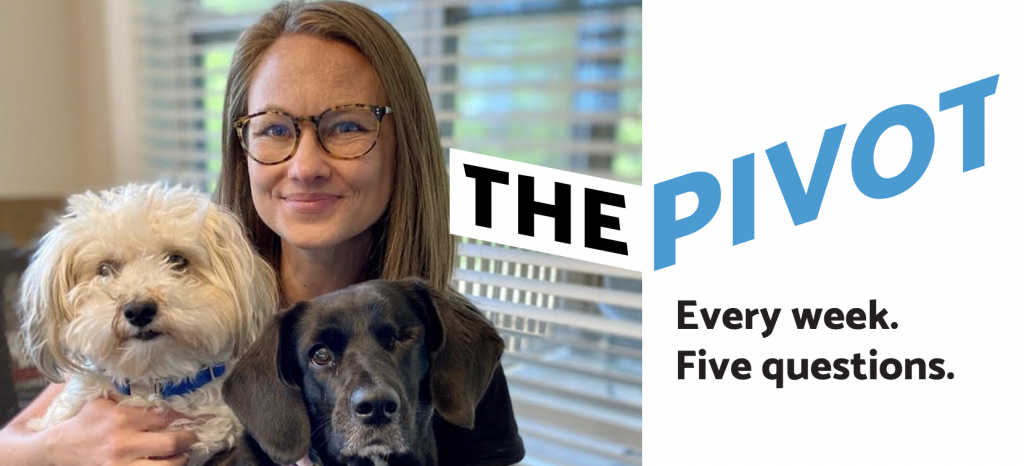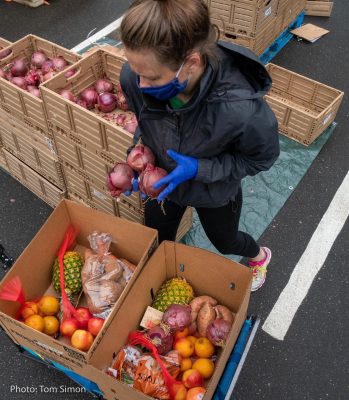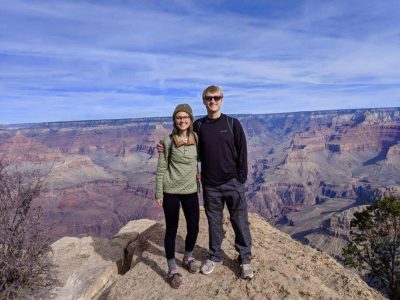
Dr. Anna Austin seeks strategies that support children, caregivers and families.

What’s your role in public health?
At Gillings, I’m an assistant professor in the Department of Maternal and Child Health (MCH). I’m also core faculty at the UNC Injury Prevention Research Center.

Can you describe your focus area in one sentence?
I want to better understand how we can support children and their caregivers.
I categorize my research into three primary areas, all of them around a theme of supporting children and families.
- The first area is preventing traumatic or adverse childhood experiences, specifically child abuse and neglect.
- The second area is substance use and overdose, especially among pregnant and parenting people. How can we better support their needs and their children’s needs?
- The third area is material hardship, including lack of basic necessities like diapers, housing and food, and how this intersects with different health outcomes. This includes examining how programs and policies that address material hardship may also function as injury and violence prevention strategies.
They’re three distinct areas, but they all are interconnected and share a lot of underlying themes.

What brought you to public health?
I did my undergrad at the University of Missouri, but I had a hard time determining what to major in. I eventually settled on majors in statistics and psychology but wasn’t sure what career path I would pursue. In the process of doing community health volunteer work toward the end of my time as an undergraduate, someone suggested I might like epidemiology since I really enjoyed the volunteer work and loved statistics. I had never heard of epidemiology, so I investigated it and applied to several programs. It ended up being a great fit.
I earned my Master of Public Health (MPH) degree from Yale, and I loved my time as an MPH student. I was a public health fellow with the New Haven Mental Health Outreach for MotherS (MOMS) Partnership, which is a community-academic collaborative aimed at improving the system of mental health and social services for low-income women in New Haven, Connecticut. I went out with our community health workers to neighborhoods across the city and interviewed women caring for children. I learned a great deal about their needs, their hopes and goals for the future, and where they wanted support. That really sparked the interests that I still have today.
One of the community partners involved in the MOMS Partnership was the National Diaper Bank Network. As part of the MOMS Partnership needs assessment, we asked women whether they had a sufficient supply of diapers to change their children as often as needed — if not, that’s called “diaper need.” About a third of the women we talked with said they experienced diaper need. Many shared stories of impossible decisions they had to make about whether to spend limited financial resources on food, rent, utilities or diapers. Many shared that to leave their child at day care during the week, they had to have a sufficient supply of disposable diapers for the day. If they didn’t have a day’s supply of diapers, they couldn’t leave their child at day care and go to work, further contributing to the cycle of poverty. Federal assistance programs like WIC and SNAP don’t provide support for diapers. That was part of what guided my interest in maternal hardship, specifically diaper need. I did my master’s thesis on the association of diaper need with maternal depressive symptoms.
Many of the women I was fortunate to meet through the MOMS Partnership also spoke about trauma they had experienced during childhood: parents having mental health or substance use disorders with no access to treatment; parents being incarcerated; experiencing abuse and neglect. Several talked about how they were still coping with and processing those experiences and how they felt it was impacting their physical and mental well-being as adults. Some shared how their own children were experiencing some of these traumatic events as well. That made me wonder how we could better support families, parents and caregivers to prevent these early traumatic experiences.
None of these women wanted to keep their child in the same diaper all weekend. None of them wanted their child to witness violence or experience abuse or neglect. They just lacked adequate support. From a public health perspective, I wanted to contribute to figuring out how to best support caregivers and families to prevent material hardship and early childhood trauma.
After graduation, I worked in state government and came to North Carolina through the CDC/CSTE Applied Epidemiology Fellowship that connected me to the N.C. Division of Public Health. While there, I worked with Meghan Shanahan in the MCH department at the Gillings School. While I didn’t initially think I would pursue a doctoral degree, I found that I did want to gain additional research skills and drive my own research agenda in the areas I’m passionate about. So, I applied to Gillings, and Meghan became my adviser.

How have you pivoted in response to the coronavirus pandemic?

Dr. Austin packages boxes of food for PORCH, a local hunger relief organization. (Photo credit: Tom Simon)
I graduated from Gillings in 2019 and joined the faculty, but COVID-19 hit soon after that. I think because I was already at Gillings, it was less disruptive than if I had newly arrived. I had already established a network of peers. Most of my research uses existing survey and administrative data, which wasn’t hugely impacted.
The bigger pivot for me was trying to figure out how I could best help my community in the context of the pandemic. Throughout most of 2020, students in the MPH program and I volunteered with PORCH, a local hunger relief organization. We worked every week for several months doing drive thru food distribution, putting together boxes of food and placing them in people’s trunks. I think every week we had more than 500 cars come through.
We also worked with the Diaper Bank of North Carolina. They provide diapers, period products and adult incontinence products throughout the state. A couple of times during the pandemic, MPH students have come to my driveway and we’ve packaged thousands of tampons for the diaper bank. It was a nice way for a small number of students to get to see each other in person and connect while also giving back to the community. Now the diaper bank has an outdoor packaging area, so we go there periodically to package diapers.
[Editor’s note: Austin published an article in NC Policy Watch about the COVID-19 recession’s impact on the need for diapers and period products.]

Who are you when you’re at home?
I have two dogs that I’m probably overly obsessed with. Their names are Blueberry and Waffles. I’ve have Waffles for about eight years now, and I adopted Blueberry after I defended my dissertation in 2019. She was pretty anxious at first; within an hour of bringing her home, she escaped. She’s a small dog — part Dachshund — and she’s so fast. She was on the run for about two weeks, and it was terrible. It took some work to get her back because of how timid she was, but she’s back now. Over the last few years, she has really blossomed.

Dr. Austin and her husband visit the Grand Canyon.
I love to read. Lately I’ve been reading a lot of memoirs, like Know My Name by Chanel Miller. It’s a book I think everyone should read, but particularly anybody working in colleges and universities. Chanel was sexually assaulted by a member of the Stanford swim team on campus, and she beautifully put into words a lot of the feelings and emotions that sexual assault survivors go through and the different barriers they face as they seek justice or seek healing.
(Editor’s note: Austin recently shared a perspective piece in JAMA Internal Medicine about her own experience as a trauma survivor.)
My husband and I really love hiking and doing things outdoors. Our last trip before the pandemic hit was to the Grand Canyon, which is so much bigger and more gorgeous that you could ever imagine. We hiked to the bottom and back up in one day, which was challenging, but so beautiful.
